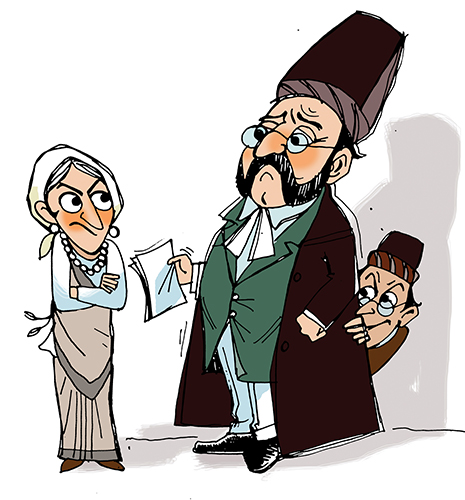The lamp case - II
Berjis Desai
A sharp and crooked Navsari pleader is acquitted of stealing a lamp, gifted to him by his former prime client and lover, which emboldens him to file a defamation suit. The legendary Sir Pherozeshah Mehta is engaged by the enraged pleader to prosecute the suit against a tricky defendant who refuses to apologize.
Navsari was super excited that the venerable Sir Pherozeshah Mehta himself would descend to conduct the defamation case. Dosibai’s barrister, Mistry, was equally formidable, though he was hard of hearing. While Meherji did not have to incur Sir Pherozeshah’s fees (on the principle of trade that a barber won’t charge another barber), Dosibai had to shell out Mistry’s fees, which she gladly did. This litigation had pulled her lonely existence out of obscurity and boredom.
Sir Pherozeshah arrived with great fanfare at the Navsari railway station, alighting from the first class compartment of the Great Indian Peninsular Railway, two attendants in tow — carrying a huge brass vessel containing purified water (Navsari well water made Sir Pherozeshah sick). A naan khatai (tin kettle) band greeted him. With sideburns and a luxurious beard, the formidable Mehta, at the peak of his career, appeared for the plaintiff in the Lamp Case — Meherji Maneckji Vakil vs Dosibai Pestonji Siganporia.

Illustration by Farzana Cooper
Justice Kothari, Meherji’s toddy guzzling buddy, was the presiding judge. The packed-to-the-brim court room went silent as Sir Pherozeshah regally marched in, exchanged pleasantries with Mistry, and sat down.
As soon as Kothari took the chair amidst the bailiff crying: "Shant thai jaav! Court chaloo chhé (Silence! The court is in session),” Mistry asked Kothari to recuse himself from the case on the ground of his proximity to the plaintiff. None had ever dared to do this. A flustered Kothari helplessly looked first at the nervous Meherjibhai, and then at Sir Pherozeshah who asked his opponent whether there was any merit in the objection. Mistry whispered something in Sir Pherozeshah’s ears (during amorous moments, Meherji had boasted to Dosibai as to what all he and Kothari had done together). Sir Pherozeshah, visibly upset, frowned at Meherji, who was shaking like a leaf.
"You ought to recuse, Judge,” boomed Mehta.
An ashen faced Kothari rose and the case was adjourned for appointing a new judge. Round one had gone to Dosibai.
Sir Pherozeshah was put up at the picturesque Lunsikui area, in a house called "Dharaka no bungalow” (legend had it that a bomb had exploded; others said that its obese owner suffered from acute gastritis and had broken wind so loudly that people thought a bomb had burst).
As soon as they were alone, Sir Pherozeshah thundered, "Is it true that you and the lady had a physical relationship?”
A trembling Meherji looked at the ground and nodded.
"One more mishap and I will leave this case,” warned the great man.
An upright Maharashtrian gentleman from Baroda was appointed as the judge.
"The defendant has repeatedly lied on oath. She had given the lamp as a gift to her lawyer and yet she falsely accused him of theft. Her complaint was dismissed. My client’s reputation, in the eyes of all right thinking members of society, has been badly eroded. Let her apologize and atone for her wrongdoing,” argued Mehta.
The wily Mistry decided to change tack.
"The lamp was stolen in the sense that the plaintiff forcibly took it away in circumstances, which, if I am forced to describe in open court, may cause great harm to all concerned,” said the barrister softly.
Meherji, and even Sir Pherozeshah, were shocked at this line of argument.
"What are you trying, Mistry?” Mehta asked his opponent on the sidelines.
"Frying?” asked a puzzled Mistry, due to his hearing handicap. "What frying?”
"Ghelsappa (fool)! Not frying! Trying! Trying!” said Sir Pherozeshah, audible even to the judge.
"She will take the stand to say that he seduced her, by abusing his fiduciary position as a lawyer,” replied Mistry.
The wise judge knew of Meherji’s colorful reputation. He adjourned court and called the parties and the lawyer into his chamber.
"Sir Pherozeshah,” said the learned judge, "this is getting to be unnecessarily unpleasant. Reputations will be further besmirched. Advise your client to withdraw.”
Meherjibhai whispered to his eminent counsel: "It’s a bluff, Sir. She will never take the witness stand to testify. And if she does you will rip her apart in cross examination.”
"Maybe, Meherji. However, I will certainly not embarrass a Parsi lady in open court. Never! Withdraw the case.”
A crestfallen Meherjibhai withdrew the case with no order as to costs.
Soon thereafter Meherjibhai consulted Navsari’s most famous astrologer, Hareshwar Joshi, who opined that the Chinese lamp had been used in China for some black magic rituals and was highly inauspicious.
On a Sunday morning Meherji hired a bullock cart to go to Dandi beach, 21 kms from Navsari (where, a few years later, Mahatma Gandhi would launch his famous Dandi March, by picking salt and not paying for it) and dumped Dosibai’s Chinese lamp into the sea.
Berjis Desai, author of Oh! Those Parsis and The Bawaji, occasionally practices law.
